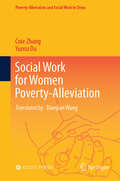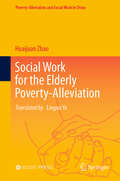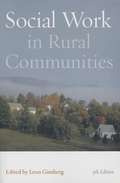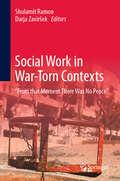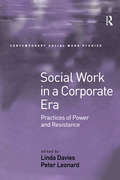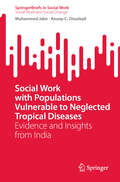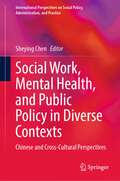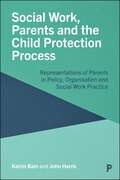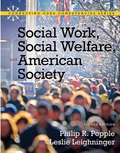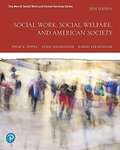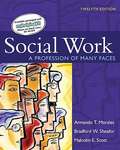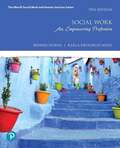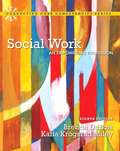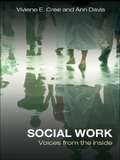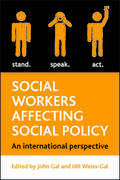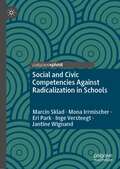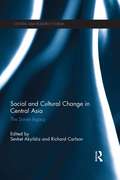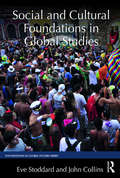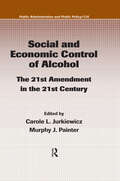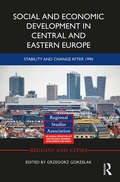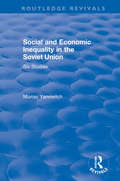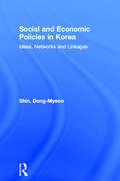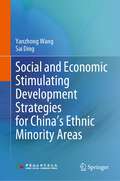- Table View
- List View
Social Work for Women Poverty-Alleviation (Poverty-Alleviation and Social Work in China)
by Cuie Zhang Yunsu DuThis book comprehensively applies social gender theory, life course theory, and spatiotemporal sociology theory to explore social work actions for poverty alleviation among women based on empirical investigations and social work practice. Taking impoverished women as the research object, this book analyzes the characteristics and difficulties of women's poverty and poverty alleviation from the vertical dimension of life course as well as from the horizontal dimension of social space Meanwhile, taking impoverished women as the service object, it systematically sorts out the main modes of social work for women’s poverty alleviation, presents classified cases of social work for poverty reduction targeting rural women in different life stages, and summarizes the main problems in the practice of social work for poverty alleviation.
Social Work for the Elderly Poverty-Alleviation (Poverty-Alleviation and Social Work in China)
by Huaijuan ZhaoThis book focuses on how to provide social work services for elderly people living in poverty. Divided into eight chapters, the book first outlines the scale, characteristics, and causes of poverty among elderly people and discusses the significance of social work in poverty alleviation for the elderly. The book then concentrates on different types of elderly people, such as those in economic and ecological poverty, and those suffering from poverty caused by illness, disability, and lack of ability, analyzing the content and service modes and providing case studies. Finally, the book discusses ways and strategies for social work participation in poverty alleviation for the elderly in the post-poverty alleviation era. This book combines theory with practice and is a useful reference for government departments, universities, as well as social organizations related to social work.
Social Work in Rural Communities
by Leon GinsbergThe Philosophy, Theory, and Practice of Teaching. The Process and Evaluation of Learning. The Organization and Structure of Social Work Education. Diversity in all forms in Social Work Practice and Education. -Social Work in multiple contexts.
Social Work in War-Torn Contexts: “From that Moment There Was No Peace”
by Shulamit Ramon Darja ZaviršekThis book provides a wide-ranging exposure of current developments related to war-torn contexts, post-war societies and social work approaches as well as analysis of the key issues facing social work in war contexts. The topic is timely due to the increased number of armed political conflicts; the number of internally displaced people, refugees and asylum seekers; increased length of wars; and, consequently, increased number of civil victims, which contribute to an exponential growth in the demand for social work. As there are few updated texts on this issue, this book meets the considerable gap existing in the social work literature and includes updates as well as continuing trends. Currently a huge number of countries are in a state of war in different continents, some of which have gone on for more than a decade. Inevitably this fact has considerable implications for their social workers as well as for the people they serve, with social workers in these countries sharing the reality of the war as citizens. The war experience is known to have long-lasting, intergenerational impacts. It also has a strong impact on the many other countries that receive refugees and asylum seekers and/or support militarily another country at war and/or refuse to support it. The book&’s country-focused chapters on Afghanistan, Bosnia and Herzegovina, Greece, Israel, Italy, Jordan, Northern Ireland, Serbia, South Sudan, Syria, UK and Ukraine cover major topics including: · The contexts of armed political conflicts from a social work perspective; · The impact of war on disadvantaged individuals and groups; · Forced migration; · Post-war societies and post-war reconstructions from a social work perspective; · The ethical issues related to war and peace from a social work perspective; · The implication for social work education and research. Social Work in War-Torn Contexts is an important and timely resource for social work and social science researchers, lecturers in different areas of social sciences, social work practitioners, as well as students. Politicians, war correspondents, international humanitarian organizations and volunteers also will find the book of interest.
Social Work in a Corporate Era: Practices of Power and Resistance (Contemporary Social Work Studies)
by Linda DaviesA striking new feature of the welfare systems in many Western countries is the extent to which market relations have permeated social services. Conceptions of 'risk management' now dominate the way parents and children are responded to, while new technologies aim to 'measure' their relationship with state service providers. Bureaucratic control is increasing, while resources are reduced. These factors have led to the demise of the traditional role of the social worker as one who engages with the client in a supportive encounter. Professional competence within social work is increasingly tied to 'mastering' scientific knowledge and new technical skills. The result of collaboration between authors from Canada, Britain and Australia, Social Work in a Corporate Era offers a critical overview of these developments and their implications. It provides a re-evaluation of the assumptions and practices of the critical social work tradition and explores the possibility of rebuilding an 'emancipatory' social work. The authors aim to disentangle the debate between Marxism, feminism and anti-racism, in the context of both postmodern challenges and the corporate restructuring of the welfare state. Calling for the development of a new politics of social work practice, this book addresses many of the urgent issues facing welfare state practitioners in health and social services today.
Social Work with Looked After Children
by Christine Cocker Lucille AllainThis revised edition details organisational systems and structures that are part of the assessment and planning process for looked after children. This is closely interwoven with discussions about their emotional development, educational, health and cultural needs and how these needs can be met through social work and a range of other services. The views of looked after children are highlighted through case studies and summaries of research findings, and the range of skills and knowledge necessary to support looked after children through the key events they experience, including loss, change and the development of new relationships, are explained and illustrated.
Social Work with Populations Vulnerable to Neglected Tropical Diseases: Evidence and Insights from India (SpringerBriefs in Social Work)
by Muhammed Jabir Anoop C. ChoolayilThis book discusses the need to establish social work for Neglected Tropical Diseases (NTDs) with an emphasis on the emerging role of effective and sustainable social interventions for the control and elimination of NTDs. NTDs are a group of infectious diseases prevalent in tropical and subtropical regions, causing significant morbidity and mortality to the world's poorest populations but receiving relatively lesser attention. They significantly affect communities with poor financial resources, inadequate sanitation and limited healthcare facilities, indicating their social dimension. Addressing NTDs requires multifaceted strategies that consider environmental, social, and economic factors, with socioeconomic factors emerging as a critical determinant. The global battle against NTDs has seen significant progress, yet social workers’ involvement remains limited, particularly in high-prevalence regions like India. This stems from undefined roles and a lack of focus within existing NTD frameworks. Integrating social work into NTD intervention is crucial for addressing the diverse challenges associated with these diseases, especially the social dimensions. Social workers, by advocating for health equity, engaging communities, addressing social determinants, and collaborating with healthcare professionals, can contribute significantly to the broader efforts in mitigating the impact of NTDs on vulnerable populations. This book builds on the social nature of NTDs to argue for the case of NTD social work. Establishing NTD social work requires efforts in training, standardising practices, research, advocacy, infrastructure development, and partnerships. Among the topics covered: Neglected Tropical Diseases: A Brief Introduction to the Global Scenario Neglected Tropical Diseases and the Social Dimension of Illness in India Social Work for the Control and Elimination of Neglected Tropical Diseases Towards Sustainable Impact: Future Directions in Social Work for NTD Control and Elimination Social Work with Populations Vulnerable to Neglected Tropical Diseases helps readers to understand the intersectional nature of health inequities and effectively work towards the control and elimination of diseases of poverty, specifically NTDs. The book is useful reading for health social workers, social work educators, healthcare professionals, medical and public health educators, and public policy and health policy researchers.
Social Work, Mental Health, and Public Policy in Diverse Contexts: Chinese and Cross-Cultural Perspectives (International Perspectives on Social Policy, Administration, and Practice)
by Sheying ChenThe discipline of social policy, oftentimes deemed a part of social work as a profession, was born in the West. Unlike social policy that started with the post-war idea of a welfare state in the mid-20th century, social work traces its roots to individual casework pioneered by the Charity Organization Society (COS), early social administration including state-wide poverty relief (an advocacy effort of the COS but with deep roots in the English Poor Laws of the 17th century), and social action emphasizing political activities to improve social conditions (originating from the Settlement House Movement which began in the 1880s).The development of social work is historically intertwined with that of public welfare, philanthropy, and charity and is an inherently international subject. This conception is broader than “international social work” as a discrete field of professional practice, which crosses geopolitical borders and all levels of social and economic organizations with a focus on development. However, each nation has a story of its own in terms of professionalization of social work in the evolution of public welfare and philanthropic/charitable undertaking within its particular economic, political, social, and cultural settings. A wide-ranging and in-depth study of various (especially non-Western) country cases is essential to an adequate, comprehensive understanding of the social work profession, which is also a basic requirement of its value of diversity.China is undoubtedly an important case with the largest population on earth. It’s also unique in view of so-called Chinese characteristics which are sometimes fundamentally different from other (particularly Western) societies. It’s even intriguing given the country’s lengthy, complex history and its recent, rapid rise to a global superpower with a claim of national goals and core values that seem to be rather considerable to social work as a helping profession. Therefore, any significant lessons learned from the Chinese experiences would help with a better international understanding and further advancement of social work and public welfare at a global scale.
Social Work, Parents and the Child Protection Process: Representations of Parents in Policy, Organisation and Social Work Practice
by John Harris Katrin BainDespite the pivotal role played by parents in the child protection process, little attention has been paid to how social workers perceive them. Exploring representations of parents within Children’s Services – at the levels of policy, organisation and frontline practice – the concept of citizenship is used to construct a typology with ten variants of parent-citizenship. The typology reveals the complexities of parental representations and their relationship to the content of policy, organisational environments and dominant societal themes, as it uncovers how social workers represent parents in their day-to-day practice. The book is a resource that can be used by students, practitioners, researchers and parent advocacy organisations to evaluate policy and practice and to contribute to the search for the best possible outcomes for families. Arguing that parental participation in the child protection process is essential, the book increases the visibility of parents and contributes to a much-needed dialogue about working with parents in Children’s Services.
Social Work, Social Welfare and American Society
by Philip R. Popple Leslie LeighningerSocial Work, Social Welfare and American Society provides students with a political perspective on social welfare with definitions of liberal, conservative, and radical positions - in order to help them better appreciate the political context of social welfare programs. Each chapter reflects and integrates the core competencies in the 2008 Educational Policy and Accreditation Standards (EPAS) set by the Council on Social Work Education (CSWE). End-of-chapter assessment reinforces this integration, and MySocialWorkLab. com activities support the mastery of CSWE's core competencies. This popular introductory text is written by two of the best-known authors in social work and social welfare. The Eighth Edition continues to examine the values, ethics, and knowledge needed by social workers, as well as exploring social workers' current roles in social welfare programs. A key strength of this text is its strong coverage of the history of social welfare movements. It allows students to place welfare developments in an historical context.
Social Work, Social Welfare, And American Society
by Leslie Leighninger Philip Popple Robert LeighningerHelps readers understand and analyze social work and social welfare within the context of modern political systems Taking a critical-thinking approach, Social Work, Social Welfare, and American Society describes and analyzes social work and social welfare within the framework of American political belief systems to help students put social work practice into context. The thoroughly updated 9th Edition features an increased focus on social work practice throughout the text and in two new chapters (Chs. 1 and 5) while continuing to examine the most up-to-date issues in the politics of social welfare. The 9th Edition adds discussions of the progressive and radical perspective on social welfare in addition to liberal and conservative positions. It also features new discussions on a wide range of issues that include intersectionality, poverty and inequality, restorative justice, and the opioid epidemic.
Social Work: A Profession of Many Faces
by Armando Morales Bradford Sheafor Malcolm ScottThis best-selling text continues to offer a comprehensive introduction to the field of social work with a unique focus on the diverse groups to whom social workers provide services; including children, older adults, disabled persons, and members of minority racial and ethnic groups. <P><P>It covers the emergence of the profession of social work, career oportunities for social workers, and the values and competencies required of social workers. <P><P>Timely issues that this edition addresses include the following: the events of 9/11 and their dramatic influence on human services in the United States; the United States involvement in Middle East warfare; the physical and emotional damage to individuals involved in Middle East warfare; and the 2000 Census---how substantial changes in the U.S. population suggest a need for realignment of social services.
Social Work: An Empowering Profession
by Brenda Dubois Karla MileyWith its strengths and empowerment approach, Social Work: An Empowering Profession, 7 explores contemporary themes such as diversity and social justice and integrates the Council on Social Work Education's core competencies throughout. Each chapter reflects and integrates the core competencies in the 2008 Educational Policy and Accreditation Standards (EPAS) set by the Council on Social Work Education (CSWE). End-of-chapter assessment reinforces this integration, and MySocialWorkLab.com activities support the mastery of CSWE's core competencies.
Social Work: An Empowering Profession, 8th Edition
by Karla Krogsrud Miley Brenda L. DuboisApplies the empowerment perspective to the Social Work profession. Social Work: An Empowering Profession, 8/e introduces the social work profession and interweaves contemporary themes of strength, human rights, and social justices. In addition, this title details the empowerment-oriented roles of the social worker as consultant, resource manager, and educator. Connecting Core Competencies series -- Each chapter highlights the core competencies and practice behavior examples found in the Educational Policy and Accreditation Standards (EPAS) set by the Council on Social Work Education (CSWE). Critical thinking questions throughout reinforces these connections. Learning Goals Upon completing this book, readers will be able to: Understand the Social Work Profession. Apply principles of empowerment to various fields of social work practice. Apply critical thinking skills to case scenarios presented throughout the text. Analyze issues faced by clients using a human right and social frame. Examine personal perspectives and biases.
Social Work: Voices from the inside (Student Social Work Ser.)
by Ann Davis Viviene E. CreeSocial Work: Voices from the Inside offers unique insight into social work from the perspectives of those ‘on the inside’, that is, service users, carers and practitioners. Drawing on a narrative tradition, fifty-nine people from across the UK tell their stories about how and why social work came into their lives, and what happened next. Key topics are discussed, including: children and family social work criminal justice social work mental health social work residential child care social work with disabled people social work with older people lessons for the future. Focusing on issues for good practice in social work and social work education, this book is essential reading for students and academics of social work and social policy. It will also appeal to social work professionals and those in allied health, education and care areas.
Social Workers Affecting Social Policy: An International Perspective
by John Gal and Idit Weiss-GalFurthering social justice and human rights is a fundamental principle underlying the social work profession. Engaging in social policy formulation processes is a major route through which social workers can realise this goal. This type of social work activity has been termed ‘policy practice’. The aim of this book is to shed light on policy practice in social work discourse, education and practice in eight liberal democracies. This is the first effort to undertake a cross-national study of social worker engagement in social policy formulation processes. The book offers insights into questions such as ‘what is the importance attributed to social worker involvement in policy change in the social work discourse and education in different countries?’ and ‘how do social workers influence social policy in various national settings?’ These issues are relevant to social worker practitioners, students, educators and researchers, as well as to social policy scholars, who are interested in the role of professionals in social policy formulation.
Social and Behavioral Sciences for National Security: Proceedings of a Summit
by Engineering Medicine National Academies of SciencesIn the coming years, complex domestic and international environments and challenges to national security will continue. Intelligence analysts and the intelligence community will need access to the appropriate tools and developing knowledge about threats to national security in order to provide the best information to policy makers. Research and knowledge from the social and behavioral sciences (SBS) can help inform the work of intelligence analysis; however, in the past, bringing important findings from research to bear on the day-to-day work of intelligence analysis has been difficult. In order to understand how knowledge from science can be directed and applied to help the intelligence community fulfill its critical responsibilities, the National Academies of Sciences, Engineering, and Medicine will undertake a 2-year survey of the social and behavioral sciences. To launch this discussion, a summit designed to highlight cutting-edge research and identify future directions for research in a few areas of the social and behavioral sciences was held in October 2016. This publication summarizes the presentations and discussions from the summit.
Social and Civic Competencies Against Radicalization in Schools
by Marcin Sklad Mona Irrmischer Eri Park Inge Versteegt Jantine WignandThis book discusses a range of interventions that can be implemented in schools to prevent radicalization and violent extremism. The book advocates for primary prevention by strengthening social and citizenship competences of youth. It combines perspectives of citizenship education, school psychology, positive psychology, peace psychology and social-emotional learning to highlight the spectrum of approaches that practitioners can consider adopting or advocating for. Mechanisms of radicalization the approaches may relate to are also discussed making it useful not only for practitioners and policy makers developing and implementing preventive interventions at schools, but also for academics studying radicalization and students of education, youth work and educational psychology. The authors discuss relevant concepts such as identity development, perspective taking, political self-efficacy, citizenship competences and youth empowerment, mindfulness and self-regulation.
Social and Cultural Change in Central Asia: The Soviet Legacy (Central Asia Research Forum)
by Richard Carlson Sevket AkyildizFocusing on Soviet culture and its social ramifications both during the Soviet period and in the post-Soviet era, this book addresses important themes associated with Sovietisation and socialisation in the Central Asian states of Kazakhstan, Kyrgyzstan, Tajikistan, Turkmenistan, and Uzbekistan. The book contains contributions from scholars in a variety of disciplines, and looks at topics that have been somewhat marginalised in contemporary studies of Central Asia, including education, anthropology, music, literature and poetry, film, history and state-identity construction, and social transformation. It examines how the Soviet legacy affected the development of the republics in Central Asia, and how it continues to affect the society, culture and polity of the region. Although each state in Central Asia has increasingly developed its own way, the book shows that the states have in varying degrees retained the influence of the Soviet past, or else are busily establishing new political identities in reaction to their Soviet legacy, and in doing so laying claim to, re-defining, and reinventing pre-Soviet and Soviet images and narratives. Throwing new light and presenting alternate points of view on the question of the Soviet legacy in the Soviet Central Asian successor states, the book is of interest to academics in the field of Russian and Central Asian Studies.
Social and Cultural Foundations in Global Studies (Foundations in Global Studies)
by John Collins Eve StoddardFrom the Foundations in Global Studies series, this text offers students a fresh, comprehensive, multidisciplinary entry point to the study of the social and cultural aspects of global studies. After a brief introduction to global studies, the early chapters of the book survey the key concepts and processes of globalization as well as a critical look at the meaning and role globalization. Students are guided through the material with relevant maps, resource boxes, and text boxes that support and guide further independent exploration of the topics at hand. The second half of the book features interdisciplinary case studies, each of which focuses on a specific issue.
Social and Economic Control of Alcohol: The 21st Amendment in the 21st Century (Public Administration and Public Policy)
by Carole L. Jurkiewicz Murphy J. PainterAs a toast to success, a drowning of sorrows, a rite of passage, and the fuel for most social activities, alcohol plays a central role in our culture. Alcohol generates nearly $160 billion in US revenues annually and is a major source of tax revenue, making the stakes in the modern debate over its use, misuse, and regulation staggeringly high. Fact
Social and Economic Development in Central and Eastern Europe: Stability and Change after 1990 (Regions and Cities)
by Grzegorz GorzelakThe integration of post-socialist Central and Eastern Europe into the EU is one of the success stories of European development. The region has seen significant economic convergence, dramatic changes in socio-economic indicators and improvements in the natural environment. However, some challenges remain, such as political divergence, public governance issues and population demographics. This book identifies and analyses the key post-1990 developments across the New Member States at the sub-national and national levels, with frequent country-level and regional comparisons. Careful attention is paid to drawing out commonalities in development trajectories while appreciating each country’s unique context. Drawing on the academic literature and illuminating empirical material, the broad range of topics discussed in the book paints a detailed picture of both change and stability in Central and Eastern Europe. It will be valuable reading for advanced students, researchers and policymakers in regional studies, European studies, human geography, political economy and transition economics.
Social and Economic Inequality in the Soviet Union (Routledge Revivals)
by Murray YanowitchThis title was first published in 1977. The Soviet Union is a socially divided society. The collectivities of which it is composed, whether designated as classes, strata, or "socio-occupational groups" (a term favored in recent Soviet writings on social structure), exhibit systematic differences in incomes and living standards, in control over the organization of the work place, in the educational and occupational opportunities open to their children. But what is new is that the social and economic inequalities which permeate Soviet life have become, within limits of course, accessible to study and discussion by Soviet scholars. The principal public justification for the study of inequality is the Party’s need for reliable information to implement its function of "scientific management" of the relations between the main social groups in Soviet society. This volume is a collection of six studies.
Social and Economic Policies in Korea: Ideas, Networks and Linkages (Routledge Advances in Korean Studies)
by Dong-Myeon ShinThe sustained remarkable economic growth in the East Asian countries - Japan, South Korea, Taiwan, Hong Kong and Singapore - has brought about a great deal of debate over the role of the state in the market and society. Shin analyses the dynamic process of state interventions in the economy and social affairs in Korea from the early 1960s until the present with special reference to five policy areas: macro-economic policy, industrial policy, social security policy, labour policy, and education and training policy.Social and Economic Policies in Korea develops a unique explanation about the development of Korean social policy using the concepts of 'policy idea', 'policy network', and 'policy-linkages' to examine the causes, patterns and consequences of state interventions in the economy and social affairs over time. It should interest students and researchers of East Asian studies, social policy and development studies.
Social and Economic Stimulating Development Strategies for China’s Ethnic Minority Areas
by Yanzhong Wang Sai DingThis book gathers the outcomes of various, extensive research efforts on building a moderately prosperous society in minority areas, which would allow China’s poor and poverty-stricken areas to comprehensively join the rest of society. Offering an essential reference guide, the book will help readers understand the process, achievements, problems, and future development with regard to building a moderately prosperous society in the new era.
